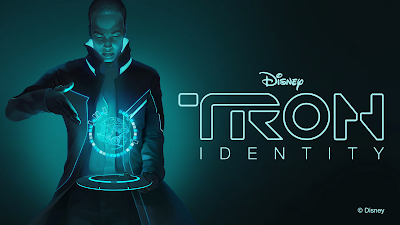Around the release of Tron: Legacy, Disney had given the franchise a good amount of legacy support, only for the IP, and plans for a third film, to be put on ice following the under-performance of Tomorrowland. In recent years, and following a string of rumors, Disney is officially bringing Tron back with a third film, Tron: Ares. Prior to this, a new game in the franchise was revealed at a recent D23 Expo, a visual novel known as Tron: Identity, which instantly caught my interest due to its interesting premise and a lack of Tron content in the interim, though I opted to wait until it was at a discount through the most recent Steam Summer Sale (with some Steam Wallet funds applied) before playing it. While I did overall enjoy the game, I’m not sure it would have been worth it if I bought it at full price.
An explosion has been reported at the Repository, an institution that works with the flow of information. You take the role of Query, a Disciple of Tron, who is sent to investigate the explosion. The exact path the story takes from here depends entirely on the choices you make throughout the gameplay. Since I opted to go in blind, knowing my choices had an impact led to a lot of situations feeling like a tough choice, a handful of which I would end up feeling bad about making due to their consequences.
 |
| You have been sent to investigate an explosion. |
The setting of the game also expands on the world of Tron in interesting ways, some of which seem like perfect fodder for additional expanded universe media. One of the most interesting contributions to Tron lore is how the game depicts the collection of data, in that it sprouts up as Data Trees that can be pruned and/or turned into books, also serving as a commentary on the manipulation of the flow of information. While this is touched upon in the films, the game further explores the ways in which Programs view Users as a higher power, including varying degrees of fanaticism and an optional scenario where Query comes dangerously close to learning the truth about the nature of Programs and having an existential crisis. Additionally, the game introduces the concept of Automata, a race of Programs who intentionally reject the appearance of Users (in a seeming twist on the Christian belief that humans are modeled after God’s image) and have developed their own culture as a result.
As stated previously, the gameplay is that of a visual novel in which your choices have consequences on the story, many of them long-lasting and can even affect dialogue options, which influence the ending in a way that encourages replay value. Since the game autosaves after every choice you make, this ensures that your actions are permanent and makes you really think about your options on a first playthrough. Fortunately, if you happen to miss any dialogue on either setting, you are able to view a chatlog of the most recent conversation, allowing you to go at your own pace and give yourself time to process what was just said. If you set the dialogue speed to only advance when you’re ready, you can more easily freely look around some areas during a conversation to unlock Codex Hotspots, which provide additional lore and can contribute to your understanding of the investigation.
 |
| Example of a partial chatlog, including an indicator of the consequences of your choices. |
Outside of dialogue trees, one other aspect of gameplay is defragging Identity Discs with varying obstacles to unlock memories and advance the investigation, which involves eliminating cards of various numbers and suits, by matching the numbers or suits within space limitations, until you reach a given number of them left. If you’re having trouble making a match, there is the option to have the AI do it for you, but you can only use this three times per game. Completing additional objectives in each game also unlocks extra disc colors and locations for Endless Mode, an extra gameplay mode in which you can play the defrag minigame as much as you wish, providing even more potential replay value to the player.
 |
| An early defragging minigame. |
Much like the underrated TV series Tron: Uprising, the visual style is based more heavily on Tron: Legacy, while incorporating the grey bodies seen in the original Tron film, making it look more like a modern update of the original film’s visual style and providing a clever way to not have race factor into the designs. In this way, the art is faithful to the source material, with the addition of color coding to help each of the characters stand out more. The lack of voice acting means the visuals have to rely more on body language, for which the game is good at, even having some subtlety in the facial expressions of some characters. In addition, your relationships with characters are visible in the Codex menu, in the form of branching paths, plus the game has a visual indicator of when a previous choice you made comes back. Much like the visuals, the music also fits in line with the Tron series, taking clear influence from Wendy Carlos and Daft Punk’s scores for the films.
If, like me, you are currently starved for Tron content or want to immerse yourself in its world again before the upcoming third film, Tron: Identity is a solid option, especially if you don’t mind the visual novel approach. Avid visual novel players may find something to like here, though it might help if they are also fans of the Tron IP. That said, if you’re only planning to play it once, the short length of a single playthrough might not be enough to justify its $15 asking price, in which case I would suggest waiting for a sale.


No comments:
Post a Comment